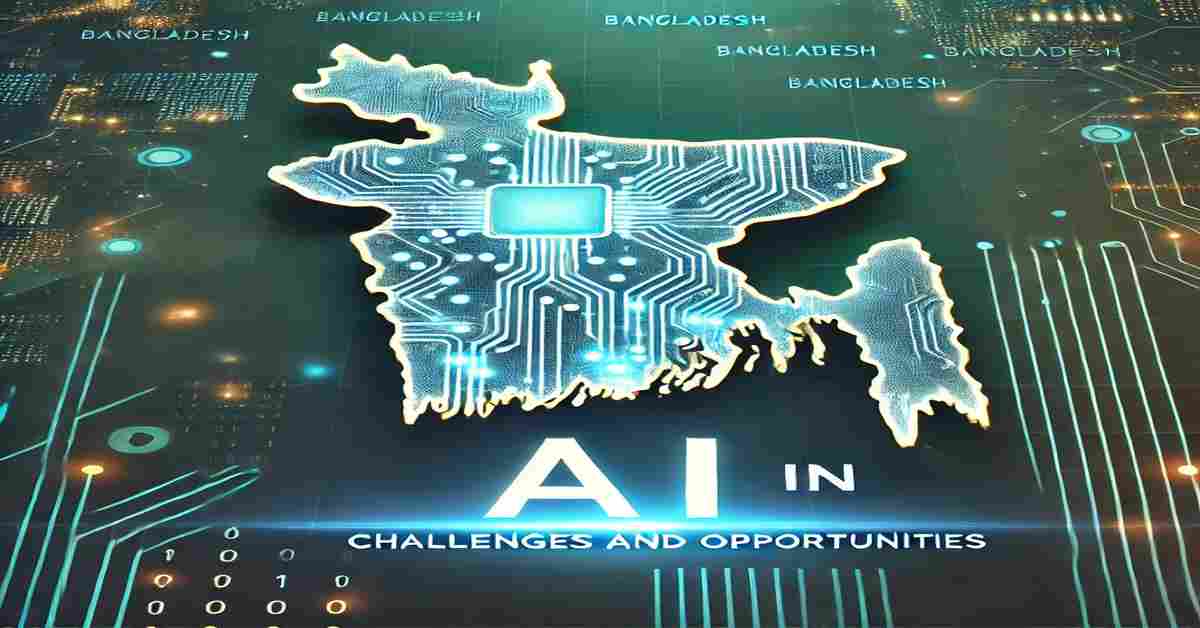Hasanat Kamal
Update: 18:04, 18 December 2024
AI in Bangladesh: Unlocking Potential Amid Challenges

Artificial Intelligence in Bangladesh: Challenges and Opportunities
Artificial Intelligence (AI) has emerged as a transformative force across the globe, reshaping industries, fostering economic growth, and revolutionizing everyday life. Countries investing in AI are reaping benefits, ranging from increased productivity to groundbreaking innovations. However, not every nation is equally prepared for this transition. Bangladesh, despite its aspirations, lags in global AI readiness. According to the International Monetary Fund’s AI Preparedness Index, Bangladesh ranks 113th out of 174 countries, signaling significant gaps in infrastructure, skills, and policy frameworks. While AI adoption is progressing in certain sectors, overcoming existing challenges is imperative to harness its full potential.
The Current Landscape of AI in Bangladesh
Despite a low ranking on the global AI readiness scale, AI utilization in Bangladesh is gradually increasing. Sectors like telecommunications, mobile banking, and agriculture are leading the charge. For instance:
-
Telecommunications: Companies are leveraging AI for customer analytics, predictive maintenance, and fraud detection. This enhances operational efficiency and customer satisfaction.
-
Mobile Banking: With the proliferation of mobile financial services like bKash, AI algorithms are being employed for transaction monitoring, fraud prevention, and personalized service delivery.
-
Agriculture: AI-powered tools are helping farmers with crop disease identification, yield prediction, and resource optimization. These initiatives aim to address food security challenges and improve agricultural productivity.
The Ready-Made Garments (RMG) industry, which contributes approximately 80% of Bangladesh’s export revenue, is also adopting AI. Through supply chain optimization, demand forecasting, and automated quality control, AI is reducing waste, lowering costs, and enhancing competitiveness in global markets.
Key Challenges in AI Development
While these advancements are noteworthy, several challenges hinder the widespread adoption and integration of AI in Bangladesh:
1. Digital Infrastructure
A robust digital infrastructure is the backbone of any AI ecosystem. Despite significant progress, Bangladesh’s infrastructure remains inadequate to support advanced AI applications. While initiatives like the National Data Center (Tier IV) at Bangabandhu Hi-Tech City are promising, nationwide internet penetration and high-speed connectivity remain limited, particularly in rural areas.
2. Skilled Workforce
The shortage of skilled professionals in AI and related fields is a critical barrier. Although organizations like the Bangladesh Computer Council (BCC) have trained over 236,000 individuals in ICT skills, there is a lack of specialized training programs focusing on AI, machine learning, and data science. This skills gap limits the country’s capacity to develop and deploy AI solutions effectively.
3. Regulatory and Ethical Frameworks
The absence of a comprehensive legal and ethical framework for AI development and deployment is another significant challenge. Issues such as data privacy, algorithmic bias, and the ethical use of AI remain unaddressed. Without clear guidelines, fostering trust in AI technologies and ensuring their responsible use becomes difficult.
4. Research and Innovation Ecosystem
AI research and innovation in Bangladesh are still in their infancy. Limited funding, inadequate collaboration between academia and industry, and a lack of focus on locally relevant applications hinder progress. This restricts the development of AI solutions tailored to the unique challenges faced by Bangladesh.
5. Economic Disparities
The uneven distribution of resources and opportunities further exacerbates the challenges. While urban areas have better access to technology and infrastructure, rural regions often lag behind. Bridging this divide is crucial for inclusive AI development.
Strategic Initiatives for AI Advancement
To address these challenges and unlock the potential of AI, Bangladesh must adopt a multi-pronged strategy. Key initiatives include:
1. Developing a National AI Strategy
A comprehensive national AI strategy is essential to guide the country’s efforts in this domain. This strategy should encompass:
-
Education and Training: Prioritizing AI-specific education at all levels, from schools to universities. Establishing partnerships with global platforms like Coursera and edX can provide access to quality training materials.
-
Research and Development: Promoting research in AI through funding, incentives, and collaborative programs involving academia, industry, and government.
-
Ethical Guidelines: Developing regulatory frameworks to ensure the ethical use of AI, protect data privacy, and address biases in algorithms.
2. Enhancing Digital Infrastructure
Investments in digital infrastructure are critical to support AI development. This includes:
-
Expanding high-speed internet access across the country, including remote and rural areas.
-
Establishing more data centers to handle the increasing demand for data processing and storage.
-
Ensuring affordable access to digital technologies for all citizens.
3. Building a Skilled Workforce
Creating a robust talent pipeline requires targeted interventions, such as:
-
Introducing AI and data science courses in academic curricula.
-
Offering vocational training programs and online courses focused on AI.
-
Encouraging women and underrepresented groups to pursue careers in AI to promote diversity and inclusion.
4. Promoting Innovation and Startups
Encouraging entrepreneurship in AI can drive innovation and create job opportunities. The government and private sector can:
-
Provide seed funding and incubation support to AI startups.
-
Establish innovation hubs and technology parks to facilitate collaboration and knowledge sharing.
-
Foster partnerships with international organizations to bring global expertise to local challenges.
5. Leveraging Global Partnerships
Collaborating with international bodies and organizations can accelerate AI development in Bangladesh. For example:
-
UNESCO’s initiative to assist Bangladesh in ethical AI development provides valuable insights and resources.
-
Partnerships with global tech companies can facilitate knowledge transfer and capacity building.
Potential Impact of AI on Bangladesh’s Economy
Harnessing the power of AI can have far-reaching implications for Bangladesh’s economy and society:
1. Boosting Productivity
AI can automate repetitive tasks, enabling workers to focus on higher-value activities. This can lead to increased efficiency and productivity across industries.
2. Driving Economic Growth
AI-driven innovations can create new industries and business models, generating employment opportunities and contributing to economic expansion. For instance, the development of AI-powered health diagnostics or agricultural solutions can address critical challenges while spurring economic growth.
3. Improving Public Services
AI can enhance the delivery of public services in sectors like healthcare, education, and transportation. For example:
-
Healthcare: AI-powered diagnostic tools can improve disease detection and treatment outcomes, particularly in remote areas.
-
Education: Personalized learning platforms can cater to the diverse needs of students, improving educational outcomes.
-
Transportation: Smart traffic management systems can reduce congestion and improve road safety.
4. Addressing Social Challenges
AI can play a pivotal role in addressing social issues such as poverty, inequality, and climate change. For example, AI-driven climate models can help predict and mitigate the impact of natural disasters, while data-driven insights can inform policies to reduce inequality.
Conclusion
While Bangladesh has made commendable progress in AI adoption, significant challenges remain. Addressing these requires a concerted effort from the government, private sector, academia, and international partners. By investing in education, infrastructure, research, and policy development, Bangladesh can position itself as a competitive player in the global AI landscape. The transformative potential of AI offers an unprecedented opportunity to drive economic growth, improve public services, and enhance societal well-being. With the right strategies and commitments, Bangladesh can not only catch up but also excel in the age of artificial intelligence.
Read More
- 32 megapixel camera new phone Tecno Spark 10 Pro
- Google Bard now in Bangladesh
- Samsung Galaxy A54 5G: A perfect price fit!
- Tottering from Twitter to Threads
- Elon Musk`s SpaceX hires 14-year-old Bangladeshi-American Kairan
- Refreshing only increases the speed of the computer?
- Twitter lost a huge number of subscribers
- boAt products now officially available in Bangladesh
- The Godfather of AI quits Google; warns of impending danger
- 4 websites to track Cyclone Mocha in real-time






























